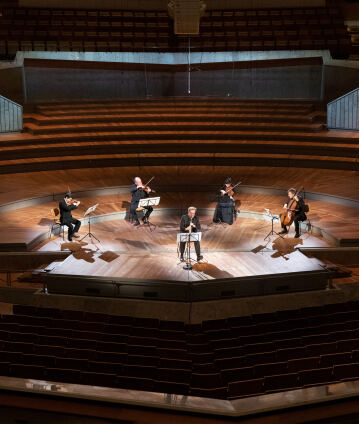The Berlin Phil Series: An evening in Vienna

This episode of the Berlin Phil Series is a musical portrait of the city of Vienna. The concert features newly recorded chamber music works by Mozart and Beethoven as well as archive recordings of orchestral songs by Franz Schubert and Hugo Wolf. The chamber musicians include the two principal clarinets of the Berliner Philharmoniker, Wenzel Fuchs and Andreas Ottensamer who as Austrians, will guarantee an authentic Viennese colour. Fuchs can be heard in Mozart’s famous clarinet quintet, and Ottensamer in Beethoven’s lively “Gassenhauer Trio”.
In Classical and Romantic chamber music, the piano and the instruments of the string quartet form the core instrumentation. The clarinet was remarkably often invited as a guest to this conspiratorial society; an instrument which inspired Mozart and Beethoven, Weber, Schumann and Brahms to write some of their most beautiful works. For the composers of the First Viennese School, the clarinet had the charm of novelty. Only in Mozart’s late symphonies and operas does it become an indispensable part of the orchestra.
In the third episode of the Berlin Phil Series, members of the Berliner Philharmoniker play Mozart’s Clarinet Quintet and Beethoven’s Gassenhauer Trio, in addition to two string duos. These works feature Wenzel Fuchs and Andreas Ottensamer, the two principal clarinetists of the Berliner Philharmoniker. Fuchs comes from Innsbruck, and Ottensamer was born in Vienna, so their origins alone make them ideal protagonists of a concert entitled “An Evening in Vienna”. The Austrian capital undoubtedly had an irresistible attraction for composers from Mozart to Mahler; two central epochal styles – the First and Second Viennese Schools – are named after it. The city may also be considered a key location for the Romantic art song, thanks in particular to Franz Schubert.
Like Carl Maria von Weber and Johannes Brahms after him, Mozart was enthralled by a great clarinet virtuoso of his time: Anton Stadler, who was also familiar to the composer as a lodge brother among the Freemasons, and for whom Mozart wrote his Quintet in addition to the famous Clarinet Concerto. The Quintet begins with the gentle sounds of the strings which, as it were, roll out a carpet for the clarinet’s first entry as it glides through the instrument’s registers. The slow movement is a soulful aria which provides the woodwind instrument with the opportunity to demonstrate its ability to sing pianissimo too. The finale is structured as a theme with variations. Beethoven’s Gassenhauer Trio also concludes with a movement of variations which follows on from a slow movement whose expressive theme is introduced by the cello. The composer took the popular and cheerful theme of the third movement, to which the work owes its nickname, from an opera popular in his time.
Recordings of Lieder from the archives of the Digital Concert Hall complement the chamber music works in this programme. The soloists are the Dutch mezzo-soprano Christianne Stotijn and the baritones Gerald Finley and Christian Gerhaher, who was artist in residence with the Berliner Philharmoniker for the 2013/14 season. From Schubert – in contrast to Haydn, Mozart, Beethoven, Brahms and Mahler a “real” Viennese – the Goethe Lieder Gretchen am Spinnrade and Der Erlkönig are performed in arrangements for voice and orchestra. We also hear the captivating Mörike setting of Der Feuerreiter by Hugo Wolf, who almost completely restricted himself to the genre of the Lied. Like Gustav Mahler, who was born in the same year, Wolf also left the provinces as a young man to seek his fortune in Vienna.
© 2020 Berlin Phil Media GmbH
Category
Artists
Our recommendations
- Philharmonic chamber music: Of pilgrims, lovers and child prodigies
- The Berlin Phil Series: Baroque concertos
- “Schubert Marathon” – Part 2
- Birthday concert of the 12 Cellists of the Berliner Philharmoniker
- An evening of chamber music with Christian Tetzlaff and members of the Berliner Philharmoniker
- Octets by Franz Schubert and Jörg Widmann